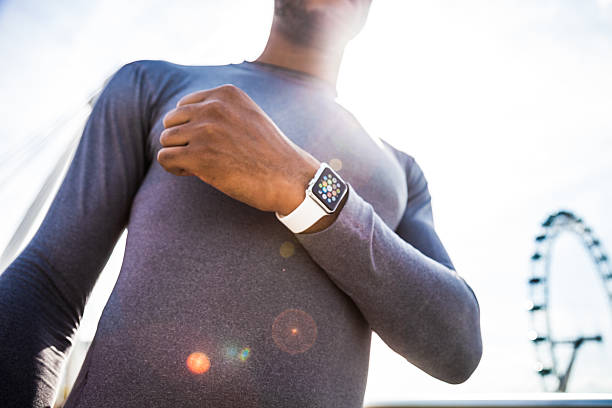When it comes to choosing a smartwatch, two major players dominate the field: Apple Watch and Fitbit. Both brands have built strong reputations for delivering high-quality wearables, but when it comes down to which is the better investment, the Apple Watch stands out as the clear winner.
In this post, we’ll break down the key differences between the Apple Watch and Fitbit, exploring why the Apple Watch offers a superior experience, whether you’re a fitness enthusiast, tech-savvy user, or someone looking for the perfect blend of health and style.
1. Design and Build Quality

Fitbit: Fitbit’s range of smartwatches, like the Versa and Sense, generally offer a sporty look with a focus on fitness. They are lightweight and comfortable for all-day wear, but they tend to have a more utilitarian appearance.
Apple Watch: Apple Watch, on the other hand, stands out with its sleek, premium design that balances aesthetics and functionality. Made with high-quality materials like aluminum, stainless steel, and titanium, it looks equally at home in the gym or at a business meeting. The square face has become iconic, and the customizable watch bands add to the versatility.
Winner: Apple Watch. With its superior build materials, sleek design, and high-end finishes, the Apple Watch elevates your style while delivering advanced functionality.
2. Fitness and Health Features
Fitbit: Fitbit built its reputation as a fitness tracker first and foremost, and its smartwatches excel in this area. Features like heart rate tracking, sleep monitoring, built-in GPS, and SpO2 sensors make Fitbit a reliable fitness companion. It also shines in terms of step counting and calorie tracking, along with guided workout routines and fitness challenges.
Apple Watch: The Apple Watch may not have started as a fitness-first device, but it has quickly overtaken Fitbit with more advanced health and fitness features. In addition to all the features Fitbit offers (heart rate, GPS, SpO2, and sleep tracking), Apple Watch goes a step further. It includes an ECG monitor for detecting irregular heart rhythms, a blood oxygen sensor, and even fall detection. The Activity Rings feature encourages users to close their rings daily, promoting a well-rounded approach to fitness. Plus, Apple Fitness+ integrates seamlessly with the watch, offering guided workouts.
Winner: Apple Watch. While Fitbit is strong in fitness, the Apple Watch’s additional health-monitoring capabilities, integration with the broader Apple ecosystem, and more comprehensive fitness tracking give it the edge.
3. Smart Features and Ecosystem Integration
Fitbit: As a fitness-first device, Fitbit’s smartwatch features are relatively basic. You can receive notifications, answer calls (on certain models), and control music, but the functionality beyond that is limited. Fitbit Pay allows for contactless payments, but the app ecosystem is small compared to Apple.
Apple Watch: This is where Apple Watch truly shines. The Apple Watch isn’t just a fitness tracker—it’s a full-fledged smartwatch that seamlessly integrates with your iPhone and the Apple ecosystem. You can answer calls, send texts, use apps, and control smart home devices right from your wrist. Features like Apple Pay, Siri, and access to the App Store take it far beyond basic fitness. The watchOS operating system is smooth and regularly updated, ensuring users always have the latest features at their fingertips.
Winner: Apple Watch. With its robust app ecosystem, seamless integration with iPhones, and smart capabilities that go far beyond fitness, the Apple Watch offers an unparalleled experience.
4. Battery Life
Fitbit: One area where Fitbit does outshine the Apple Watch is battery life. Fitbit smartwatches, like the Versa or Sense, can last up to 5-7 days on a single charge, depending on usage. This is especially handy for those who want to track sleep without worrying about nightly charging.
Apple Watch: Apple Watch, while powerful, falls short in the battery life department. Most models offer about 18-24 hours of battery life, meaning you’ll likely need to charge it daily. However, its fast charging feature helps mitigate this limitation, and the charging process is quick and easy.
Winner: Fitbit. If long battery life is your top priority, Fitbit wins with its multi-day battery life. But for many users, Apple Watch’s superior features make up for its shorter battery life.
5. Customization and Personalization
Fitbit: Fitbit offers some level of customization, with a variety of bands and watch faces, but the options are somewhat limited compared to Apple. Most Fitbit models share a similar sporty design, and the number of third-party accessories is smaller.
Apple Watch: Apple Watch is a leader in customization. With a wide variety of watch bands—ranging from sport to luxury styles—and countless watch faces that can be personalized to your preferences, the Apple Watch feels like it’s truly yours. Whether you’re looking for something rugged for workouts or a more elegant band for formal settings, there’s an Apple Watch combination for you.
Winner: Apple Watch. The level of customization is unmatched, allowing you to tailor the device to your style and needs.
6. Price and Value
Fitbit: Fitbit tends to come at a lower price point than the Apple Watch, making it a more affordable option for budget-conscious buyers. The Fitbit Versa 3 or Sense offers strong value for those primarily focused on fitness tracking, priced between $200-$300.
Apple Watch: The Apple Watch starts at a higher price, with the latest models like the Apple Watch Series 9 and Apple Watch Ultra ranging from $399 to over $800 depending on the materials and features. However, older models like the Apple Watch SE offer a more affordable entry point, while still providing excellent features.
Winner: Apple Watch (long-term value). While Fitbit may have the edge on price, the Apple Watch offers far more value in terms of its features, versatility, and integration with the broader Apple ecosystem.
7. Overall Performance
Fitbit: Fitbit delivers solid performance as a fitness-focused device, with reliable health tracking and basic smartwatch features. It’s a great option for those who prioritize fitness above all else.
Apple Watch: Apple Watch is the all-around champion, offering top-tier health and fitness tracking alongside unmatched smart features. Whether you’re making calls, checking notifications, or using it as a fitness coach, the Apple Watch is the complete package. Its processing speed, smooth interface, and regular software updates ensure that it stays at the top of its game.
Winner: Apple Watch. The overall experience, from health tracking to smart features, outperforms Fitbit in almost every category.
Conclusion: Why the Apple Watch is Better
While Fitbit is a strong choice for those who want a fitness-first device with long battery life, the Apple Watch is the better smartwatch overall. Its sleek design, advanced health features, superior smart functions, and deep integration with the Apple ecosystem make it an unparalleled companion for both your workouts and daily life. If you’re an iPhone user looking for the best all-around experience, the Apple Watch is hands-down the better choice.
Whether you’re tracking your fitness goals or staying connected throughout your day, the Apple Watch does it all—and does it better.

